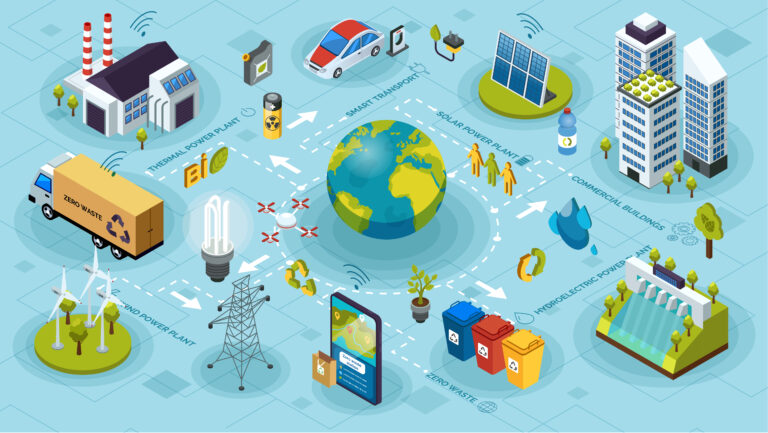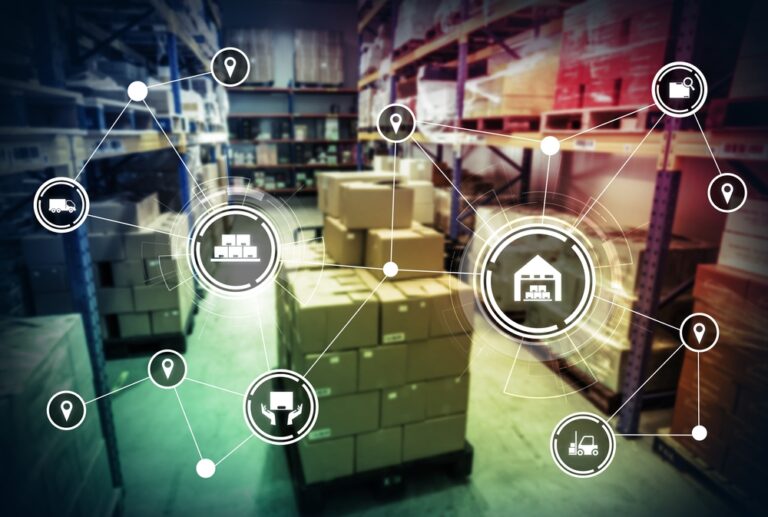When it comes to world changing tech trends, last year was a bumper year with the dawn of everyone’s new friend/frenemy, generative AI. So what’s in store for us in 2024?
To find out, we asked our in-house experts what they thought would be the most interesting tech trends, particularly in climate tech, clean tech and sustainable industry. Here are their responses across a broad spectrum, ranging from clean energy, to AI, to construction, to mobility and sustainable packaging.
The Future of Energy Systems

I see this as a year where the future of our energy system begins to materialize. I am optimistic that we will see real acceleration in areas including clean hydrogen fuels for aviation and shipping, new battery solutions for e-mobility and logistics, or better flexibility to enable existing infrastructure, making the energy transformation more tangible than ever. For instance, Formula One race cars, space rockets or government mandated sustainable aviation fuel blending represent early off-takers of still scarce and expensive hydrogen fuels. This might seem irrelevant to larger systems that need to transition. However, these applications are the steppingstone to a next scale-up and important cost-down. The lessons learned will shape the key to fuel the future of our economies and preserve the health of our planet.
- Christoph Frei, Partner, Energy
Carbon, Ammonia and Green Hydrogen

Voluntary Carbon Markets are maturing by shaking off the lower quality and hard to MRV (measurement, reporting, verification) credits. Durable, trustworthy credits are emerging, albeit from a smaller basis. This has been supported by large purchases from Microsoft in December. That said, cost remains a concern in the short term ($300+/tCO2).
Ammonia is clearly more than a fertilizer precursor, it is a hydrogen carrier, marine fuel, and a fuel to potentially co-fire in power plants (e.g. Japan). This will trigger more projects for clean ammonia production and adjacent developments of crackers.
Incentives for green hydrogen, e.g. the 45V H2 production tax credit, will result in new announcements for clean hydrogen production and could push projects towards final investment decisions. However, fulfilling the strict conditions to qualify for the credits might pose challenges.
- Max Hefti, Investment Manager, Energy
Swiss Tech Trends

Looking at the 131 Swiss startups in the Technology Fund, I see a couple areas of growth:
- The electrification of transportation and mobility (trucks, utility vehicles of all sizes, charging infrastructure, corporate fleets) has been fueled by the corporate struggle to get to net-zero, keep cities clean and reduce noise. Start-ups to watch: FLUX Mobility, Juice Technology, Designwerk / Futuricum, Urban Connect
- Solar, solar, solar: Fueled by the energy crisis, BIPV (building integrated photovoltaics) are really taking off, becoming the new standard, making solar beautiful. Start-ups to watch: Solaxess, SwissPV, Freesuns
- The digitalization of logistics, which has been fueled by delays, quality and security concerns with current logistics systems, is adding transparency to inter-modal transportation and to transportation assets, decreasing waste and theft. Start-ups to watch: Nexxiot, Arviem, skycell
- Simone Riedel Riley, Partner, Technology Fund
Generative AI

This year, the transformative influence of generative AI will extend beyond reshaping work landscapes to impacting climate tech trends significantly. It will accelerate environmental research, help to optimize renewable energy, and will revolutionize decision-making through the analysis of vast datasets and predictive modeling. AI-driven chatbots will continue to blur the lines between human and machine interactions and go beyond mere customer service to becoming an integral tool for internal and complex tasks within companies. As we navigate these changes, ethical considerations and transparency will become paramount.
- Nastaran Asadi, Investment Manager, AI
Low Carbon Manufacturing and Construction

Low carbon manufacturing and construction technologies represent a transformative approach in the industrial and building sectors, focusing on reducing greenhouse gas emissions and environmental impact. These technologies encompass a wide array of topics, from digitalization to automation, AI and advanced materials, each specifically designed to minimize carbon footprints and increase the efficiency of operation. In manufacturing, this involves optimizing production processes through highly automated and energy-efficient machinery, renewable energy sources, and sustainable materials. In the realm of construction, low carbon technologies include the use of eco-friendly building materials or use of data and connectivity to increase efficiency and to reduce input resources. Start-ups to watch: Hiboo, Phase Change Solutions, Sewts
- Mehran Zaker, Investment Director, Mobility & Automation
Sustainable Packaging

There is a wealth of technology that is ripe for investment in the sustainable packaging universe in 2024. This includes the Internet of Packaging, Biodegradable Packaging, Digital Printing, Packaging Automation, Active Packaging, Custom Packaging, Recyclable Packaging, Edible Packaging, 3D Printing, Nanotechnology, and much more! Start-ups to watch: Genesis, Paptic
- Fredric Petit, Partner, Packaging
